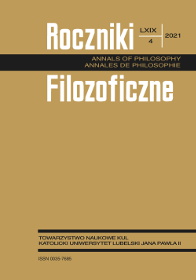Wrongdoing and Forgiveness in Boris Pasternak’s Doctor Zhivago
Abstract
Could even the most ideal love justify betrayal? The author invites the reader to examine Boris Pasternak’s Doctor Zhivago through the lens of wrongdoing and forgiveness. She ponders whether Lara Antipova and Yura Zhivago can justify their actions with the beauty and the force of their love. In the light of the moral consequences of their actions, she finds such justification to be impossible. In her view the novel, culminating in the main characters’ deaths, opens itself to a transcendental sphere in which wounded people are laid bare in their humanity before themselves, free of the baggage of guilt and harm, ready for conciliation.
References
Clowes, Edith W. 1990. “Characterization in Doktor Živago: Lara and Tonja.” The Slavic and East European Journal 34: 322–331.
Danov, D. K. 1981. “Epiphany in Doctor Zhivago.” The Modern Language Review 76: 889–903.
Hughes, Paul M. 2000. “Na czym polega wybaczanie?”. In Filozofia moralności. Wina, kara, wybaczenie, edited by Jacek Hołówka, 457–268. Fragmenty filozofii analitycznej. T. VII. Warszawa: Aletheia.
Hughes, Paul M., and Warmke, Brandon. 2007. “Forgiveness”. In The Stanford Encyclopedia of Philosophy, edited by Edward N. Zalta. https://plato.stanford.edu/archives/sum2017/entries/forgiveness/.
Lewis, Clive Staples. 1960. The Four Loves. New York: Harcourt, Brace.
Mallac, Guy de. 1981. Boris Pasternak: His Life and Art. Norman: University of Oklahoma Press.
Masing-Delic, Irene. 2009. “Larissa—Lolita, or Catharsis and Dolor, in the Artist-Novels Doktor Zhivago and Lolita.” In Irene Masing-Delic. Exotic Moscow Under Western Eyes, 179–202. Boston: Academic Studies Press.
Mills, Jon K. 2000. “Wybaczanie sobie i przedstawienia własnego ‘ja’ moralnego (moral self-representation).” In Filozofia moralności. Wina, kara, wybaczenie, edited by Jacek Hołówka. Fragmenty filozofii analitycznej. T. VII. Warszawa: Aletheia: 483–485.
Nussbaum, Martha. 1990a. “‘Finely Aware and Richly Responsible’: Literature and the Moral Imagination.” In Martha Nussbaum. Love’s Knowledge: Essays on Philosophy and Literature, 148–167. Oxford/New York: Oxford University Press.
Nussbaum, Martha. 1990b. “Introduction: Form and Content, Philosophy and Literature”. In Martha Nussbaum. Love’s Knowledge: Essays on Philosophy and Literature, 3–53. Oxford/New York: Oxford University Press.
Pasternak, Boris. 1958. Doctor Zhivago. Translated from the Russian by Max Hayward and Manya Harari. New York: Pantheon Books.
Pettus, Mark. 2013. “Staging Hamlet: The Ethical and Aesthetic Dimensions of Space in Pasternak’s Doctor Zhivago.” The Slavic and East European Journal 57: 561–580.
Piłat, Robert. 2003. Krzywda i zadośćuczynienie. Warszawa: Wydawnictwo Instytutu Filozofii i Socjologii PAN.
Piłat, Robert. 2013a. “Ontologia pojednania”. In Powinność i samowiedza. Studia z filozofii praktycznej, edited by Robert Piłat, 63–74. Warszawa: Wydawnictwo Uniwersytetu Kardynała Stefana Wyszyńskiego.
Piłat, Robert. 2013b. “Wartość milczenia”. In Powinność i samowiedza. Studia z filozofii praktycznej, edited by Robert Piłat, 47–62. Warszawa: Wydawnictwo Uniwersytetu Kardynała Stefana Wyszyńskiego.
Scanlon, Thomas M. 2008. Moral Dimensions. Permissibility, Meaning, Blame. Cambridge, MA/ London: Belknap Press of Harvard University Press.
Scheler, Max. 1992. “On the Tragic”. In The Question of Tragedy: A Selection of Essays on Tragedy and the Tragic. Translated by Bernard Stambler, edited by Arthur B. Coffin, 105–126. San Francisco: Edwin Mellen.
Snow, Nancy E. 2000. “Wybaczanie samemu sobie”. In Filozofia moralności. Wina, kara, wybaczenie, edited by Jacek Hołówka, 469–475. Fragmenty filozofii analitycznej. T. VII. Warszawa: Aletheia.
Snow, Nancy E. 1992. “Self-Forgiveness.” Journal of Value Inquiry 27: 57–65.
Copyright (c) 2021 Roczniki Filozoficzne

This work is licensed under a Creative Commons Attribution-NonCommercial-NoDerivatives 4.0 International License.





